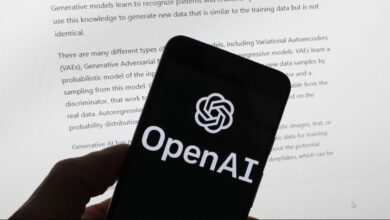The Prompt: Machine Learning Paradise

The Prompt is a weekly rundown of AI’s buzziest startups, biggest breakthroughs, and business deals. To get it in your inbox, subscribe here.
Humane’s AI Pin
Humane AI
Welcome to The Prompt.
I’m Rashi Shrivastava, a tech reporter at Forbes, and I’ll be walking you through the week’s most important developments in artificial intelligence.
Top of mind this week is OpenAI’s announcement of a new office in Japan. It will be the ChatGPT-maker’s first outpost in Asia, where it’s also rolling out a custom GPT-4 model optimized for translating and summarizing text in the Japanese language. Tadao Nagasaki, a former Amazon Web Services executive, will head the operations. It’s a noteworthy move for OpenAI, as Japan’s copyright laws and regulations for AI developers have historically been more lax than other countries like the U.S. and U.K. Japan, which has been called a “machine learning paradise,” passed a law that broadly allowed some copyrighted materials to be used for training AI models without consent — even for commercial purposes.
“The idea was to make Japan very attractive to AI businesses so that they would develop their models in Japan,” said Joseph Grasser, a partner at law firm Squire Patton Boggs. “This was seen as a way to get around the perception that Japan is ‘behind’ in the AI race.”
Now, let’s get into the headlines.
CHAMPION CHIPS
Google unveiled a new AI chip, dubbed Axion, part of its effort to reduce its dependence on external vendors for expensive compute resources. Built on ARM’s central processing units or CPUs, the chips are useful for training AI models and running general workloads. Google claims these new processors offer up to 30% better performance than existing ARM chips and are 60% more energy efficient than existing comparable options. Training its AI model Gemini on its in-house custom silicon has given the tech giant an edge in the cutthroat AI arms race.
ETHICS + LAW
Thousands of reports to NCMEC’s CyberTipline last year were about suspected CSAM created using AI.
Getty
After widespread reports of AI-generated pornographic images of students circulating across U.S. schools and AI being used to create and distribute images of child sexual abuse, AI companies including OpenAI, Stability AI and Anthropic have started reporting child sexual abuse material generated on their platforms to the National Center for Missing and Exploited Children, Forbes reported Tuesday.
Meanwhile, the U.S. Department of Justice is looking into whether rival AI companies have overlapping executives or board members, which could violate antitrust laws. This is a fast emerging concern as tech behemoths like Amazon, Google and Microsoft pour billions of dollars into leading AI companies like OpenAI, Anthropic and Mistral. Microsoft, for example, has invested more than $13 billion into OpenAI; it has also backed French AI model provider Mistral and recently hired former Inflection CEO Mustafa Suleyman to head its AI consumer business. The news comes just months after the FTC opened a similar investigation into the tech giants backing generative AI companies.
PEAK PERFORMANCE
Amazon is using AI to cut the amount of packaging materials it uses.
DPA/PICTURE ALLIANCE VIA GETTY IMAGES
Amazon ships 20 million packages a day — all in cardboard, paper and plastic packaging that typically ends up in the trash. To reduce packaging waste and cost, the retail giant uses an in-house AI model to determine the type of packaging best suited to the item being shipped. Amazon data indicates the AI model, trained on product images and descriptions, helps save 500,000 tons of packaging a year.
HUMANS OF AI
Brett Adcock, the 38-year-old founder of humanoid robotics company Figure, imagines a future in which we all own humanoid robots who do our laundry, wash our dishes and take out the trash. Beyond mundane chores like these, he sees AI-powered robots performing jobs that are unsafe for humans or augmenting workforces with labor shortages.
In January, Figure announced a partnership with German car maker BMW which plans to use its robots to perform the “dark, dirty, dull” parts of car manufacturing. A month later, the company scooped up $675 million in funding from Microsoft, Nvidia, OpenAI Startup Fund and Jeff Bezos at a $2.6 billion valuation, making Adcock, who owns 50% of the company, a billionaire. (His net worth, Forbes estimates, is $1.4 billion). Figure has also struck a deal with OpenAI to develop generative AI models for its robots that allow them to converse with humans.
AI DEAL OF THE WEEK
Microsoft announced Tuesday that it will invest $1.5 billion in G42, an Abu Dhabi-based holding company that’s developing AI products across sectors like healthcare, data centers and surveillance. The move strengthens ties between the U.S. and the UAE in the race to stay ahead of China in developing AI applications. The investment comes after G42 severed ties with China and agreed to remove Chinese equipment from its operations. G42 made a secret pact with the U.S. to divest from China before making the deal with Microsoft, according to a Bloomberg report.
Also notable: Helmed by former Amazon VP Brad Porter, Collaborative Robots has raised $100 million for its “cobots” or collaborative robots, which use large language models like GPT-3.5 and GPT-4 to ask questions and understand human speech.
DEEP DIVE
Saudi Arabia’s government is trying to transform its capital city of Riyadh into an AI hub.
AFP VIA GETTY IMAGES
At a recent tech conference, Saudi Arabian officials extolled the kingdom’s generative AI accelerator, Gaia, to which it had committed $1 billion in an effort to create 300 new AI startups in just three years. The program is part of a broader attempt to diversify Saudi Arabia’s economy and establish its capital Riyadh as a hub for AI startups.
But founders who’ve gone through the Gaia program told Forbes that the kingdom has been slow to pay out on promised government grants — if it has paid out at all. Each founder expected to receive $40,000 in government grants and an additional $100,000 in equity investment from New Native, the startup accelerator that ran the Gaia program. Interviews with seven Gaia founders, internal documents and Zoom meeting recordings reviewed by Forbes, show that many of the startups have not received the grants, or the investment, which totaled an estimated $4.2 million.
The only startups to benefit from Gaia’s pitch were members of the program’s first cohort, who received the Saudi government grants and just a fraction of the investment from New Native, two of the founders said. Five others who spent tens of thousands of dollars on travel and lodgings to participate in the 10-week, Riyadh-based program in 2023 and 2024 said they hadn’t received any money at all. “These founders stopped what they were doing to spend a couple of months in the kingdom and spent over $20,000, and they are very bitter about this,” one said. “This looks bad for the Saudi government.”
The Saudi dreams of founders who took part in the Gaia program have also taken a dent. Gaia founders said that some of the startups involved have folded, or stalled, while many are still out of pocket.
Meshal Alkabeer, the VP of entrepreneurship for the National Technology Development Program (NTDP), the Saudi government agency bankrolling the program, told Forbes the grants were now being processed for startups that had filed the necessary paperwork. NTDP and the accelerator New Native told Forbes that the Gaia program’s next cohort was on hold until more funds had been raised from outside backers.
AI INDEX
The total number of generative AI models that were launched in 2023, according to Stanford’s AI Index report published by Stanford University’s Human Centered Artificial Intelligence lab: 149
Share of those newly-released models that were open source: 65.7%
Cost of compute used to train OpenAI’s large multi-model model, GPT-4: $78 million
Cost of compute used to train Google’s latest AI model, Gemini Ultra: $191 million
Number of AI-related regulations that were passed in 2023: 25
Number of AI regulations in 2016: 1
YOUR WEEKLY DEMO
Last year, San Francisco-based AI company Humane announced a $699 AI Pin. Relentlessly hyped, the device can make phone calls, send messages, take photos and answer general questions, thanks to OpenAI and Microsoft’s AI models. Humane has touted the device as a “personal assistant” and a “second brain.” But according to the first, largely scathing reviews of the device, it falls woefully short of those promises.
David Pierce at the Verge called Humane’s AI pin “thoroughly unfinished” and “totally broken.” (“The one and only thing I can truly rely on the AI Pin to do is tell me the time,” he writes.) Joanna Stern at the Wall Street Journal didn’t even bother to write a full review of the device, instead posting a short video highlighting its serious overheating issues. Meanwhile, Marques Brownlee summarized it as “slower, more annoying or less accurate” than a phone. “It’s safe to say the AI Pin deserves an exhibit alongside Juicero and Clinkle in the museum of Silicon Valley misfires,” wrote Benjamin Sandofsky, cofounder of camera app Halide.
It’s a brutal debut for Humane, a company founded by former Apple executives Imran Chaudhri and Bethany Bongiorno, backed by entities like OpenAI CEO Sam Altman and supported by some $241 million in venture capital. As one Reddit poster wrote: “The amount of talent this company poached from Apple to build this piece of shit is hilarious.”
QUIZ
Which AI company is backed by high profile investors like Jeff Bezos, Meta’s Chief AI Scientist Yann LeCunn, Google’s Chief Scient Jeff Dean and former YouTube CEO Susan Wojcicki?
A. OpenAI
B. Hugging Face
C. Perplexity
D. Anthropic
Check your answer here.
MODEL BEHAVIOR
A new $400 Oral B toothbrush claims to use AI for “3D teeth tracking” and “position detection.” The toothbrush uses a Bluetooth connected app on your phone and “smart sensors,” to detect whether you are brushing your teeth with too much or too little pressure. Salesforce CEO Marc Benioff tweeted that the AI toothbrush might be a sign that the AI hype cycle has reached its peak.
Sign up here to get The Prompt weekly.
MORE FROM FORBES


